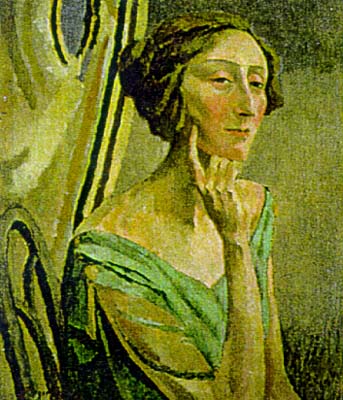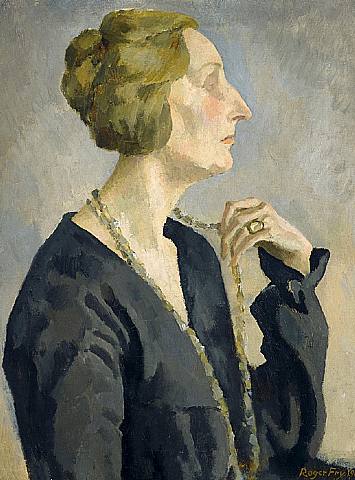|
English Poet Dame Edith Sitwell (1887-1964) |

Portrait of Sitwell by Roger Fry
(This work of art is in the public domain.)
Edith Sitwell was born in Scarborough, Yorkshire, the only daughter of Sir George Sitwell, 4th Baronet, of Renishaw Hall; he was an expert on genealogy and landscaping. Her mother was the former Lady Ida Emily Augusta Denison, a daughter of the Earl of Londesborough and a granddaughter of Henry Somerset, 7th Duke of Beaufort. She claimed a descent through female lines from the House of Plantagenets founded by Henry II of England.
During World War II, Sitwell returned from France and retired to Renishaw with her brother Osbert and his lover, David Horner. She wrote poems under the light of oil lamps when the lights of England were out of service. She knitted clothes for their friends who served in the army. One of the beneficiaries was young Alec Guinness, the actor, who received a pair of seaboot stockings. The poems she wrote during the war brought her back before a public. They include Street Songs (1942), The Song of the Cold (1945) and The Shadow of Cain (1947), all of which were much praised. Still Falls the Rain, about the London blitz, remains perhaps her best-known poem.
Sitwell wrote two books about Queen Elizabeth I of England, Fanfare for Elizabeth (1946) and The Queens and the Hive (1962). She always claimed that she wrote prose simply for money and both these books were extremely successful, as were her English Eccentrics (1933) and Victoria of England (1936). Sitwell published her first poem The Drowned Suns in the Daily Mirror in 1913 and, between 1916 and 1921, she edited Wheels, an annual poetic anthology compiled with her brothers—a literary collaboration generally called "the Sitwells". In 1929 she published Gold Coast Customs, a poem about the artificiality of human behaviour and the barbarism that lies beneath the surface. The poem was written in the rhythms of the tom-tom and of jazz, and shows considerable technical skill. Her early work reflects the strong influence of the French symbolists.
She became a proponent and supporter of innovative trends in English poetry and opposed what she considered the conventionality of many contemporary backward-looking poets. Her flat became a meeting place for young writers whom she wished to befriend and help: these later included Dylan Thomas and Denton Welch. She also helped to publish the poetry of Wilfred Owen after his death. Her only novel, I Live under a Black Sun, based on the life of Jonathan Swift, was published in 1937.
Sitwell became a Dame Commander (DBE) in 1954.
 
|
JANE, Jane,
Tall as a crane,
The morning light creaks down again;
Comb your cockscomb-ragged hair,
Jane, Jane, come down the stair.
Each dull blunt wooden stalactite
Of rain creaks, hardened by the light,
Sounding like an overtone
From some lonely world unknown.
But the creaking empty light
Will never harden into sight,
Will never penetrate your brain
With overtones like the blunt rain.
The light would show (if it could harden)
Eternities of kitchen garden,
Cockscomb flowers that none will pluck,
And wooden flowers that 'gin to cluck.
In the kitchen you must light
Flames as staring, red and white,
As carrots or as turnips shining
Where the cold dawn light lies whining.
Cockscomb hair on the cold wind
Hangs limp, turns the milk's weak mind . . .
Jane, Jane,
Tall as a crane,
The morning light creaks down again! |
|
Still Falls the Rain
by Edith Sitwell |
|
| |
Still falls the Rain---
Dark as the world of man, black as our loss---
Blind as the nineteen hundred and forty nails
Upon the Cross.
Still falls the Rain
With a sound like the pulse of the heart that is changed to the hammer-beat
In the Potter's Field, and the sound of the impious feet
On the Tomb:
Still falls the Rain
In the Field of Blood where the small hopes breed and the human brain
Nurtures its greed, that worm with the brow of Cain.
Still falls the Rain
At the feet of the Starved Man hung upon the Cross.
Christ that each day, each night, nails there, have mercy on us---
On Dives and on Lazarus:
Under the Rain the sore and the gold are as one.
Still falls the Rain---
Still falls the Blood from the Starved Man's wounded Side:
He bears in His Heart all wounds,---those of the light that died,
The last faint spark
In the self-murdered heart, the wounds of the sad uncomprehending dark,
The wounds of the baited bear---
The blind and weeping bear whom the keepers beat
On his helpless flesh... the tears of the hunted hare.
Still falls the Rain---
Then--- O Ile leape up to my God: who pulles me doune---
See, see where Christ's blood streames in the firmament:
It flows from the Brow we nailed upon the tree
Deep to the dying, to the thirsting heart
That holds the fires of the world,---dark-smirched with pain
As Caesar's laurel crown.
Then sounds the voice of One who like the heart of man
Was once a child who among beasts has lain---
"Still do I love, still shed my innocent light, my Blood, for thee."
|
|
By The Lake
by Edith Sitwell |
|
ACROSS the flat and the pastel snow
Two people go . . . . 'And do you remember
When last we wandered this shore?' . . . 'Ah no!
For it is cold-hearted December.'
'Dead, the leaves that like asses's ears hung on the trees
When last we wandered and squandered joy here;
Now Midas your husband will listen for these
Whispers--these tears for joy's bier.'
And as they walk, they seem tall pagodas;
And all the ropes let down from the cloud
Ring the hard cold bell-buds upon the trees--codas
Of overtones, ecstasies, grown for love's shroud |
|
Bells Of Gray Crystal
by Edith Sitwell |
|
Bells of gray crystal
Break on each bough--
The swans' breath will mist all
The cold airs now.
Like tall pagodas
Two people go,
Trail their long codas
Of talk through the snow.
Lonely are these
And lonely and I ....
The clouds, gray Chinese geese
Sleek through the sky. |
|
When Cold December
by Edith Sitwell |
|
WHEN cold December
Froze to grisamber
The jangling bells on the sweet rose-trees--
Then fading slow
And furred is the snow
As the almond's sweet husk--
And smelling like musk.
The snow amygdaline
Under the eglantine
Where the bristling stars shine
Like a gilt porcupine--
The snow confesses
The little Princesses
On their small chioppines
Dance under the orpines.
See the casuistries
Of their slant fluttering eyes--
Gilt as the zodiac
(Dancing Herodiac).
Only the snow slides
Like gilded myrrh--
From the rose-branches--hides
Rose-roots that stir. |
|

Portrait of Edith Sitwell, by Roger Fry, 1918
(This work of art is in the public domain.)
 
|
  
|



